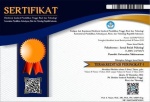Optimisme dan Posttraumatic Growth Pada Istri yang Mengalami Kekerasan Dalam Rumah Tangga
Abstract
Tujuan penelitian ini adalah untuk melihat bagaimana optimisme dan proses terjadinya posttraumatic growth pada istri yang mengalami kekerasan dalam rumah tangga di samarinda. Peneliti menggunakan penelitian kualitatif dengan pendekatan studi kasus. Penelitian menggunakan teknik purposive sampling yaitu pemilihan subjek berdasarkan ciri-ciri yang memenuhi tujuan-tujuan yang sudah ditetapkan. Metode pengumpulan data dalam penelitian ini menggumakan observasi dan wawancara mendalam, serta data dokumentasi yang terkait dengan subjek yaitu istri yang mengalami kekerasan dalam rumah tangga di Samarinda. Subjek KW, HF, dan N menunjukkan aspek optimisme permanensi, personalisasi, dan pervasivness. Ketiga subjek juga menunjukkan peningkatan kekuatan dalam diri, kemungkinan-kemungkinan baru, penghargaan dalam hidup, peningkatan spiritual and hubungan dengan orang lain.
The purpose of this study is to see how optimism and the process of posttraumatic growth occur in wives who experience domestic violence in Samarinda. Researchers used qualitative research with a case study approach. The study used a purposive sampling technique, namely the selection of subjects based on characteristics that meet predetermined goals. The data collection method in this study uses in-depth observation and interviews, as well as documentation data related to the subject, namely the wife who experiences domestic violence in Samarinda. Subjects KW, HF, and N showed aspects of optimism on permanence, personalization, and pervasiveness. The three subjects also showed increased personal strength, new possibilities, appreciation of life, spiritual development and relating to others.
Keywords
Full Text:
PDFReferences
Arif, Iman Setiadi (2016). Psikologi Positif: Pendekatan Saintifik Menuju Kebahagiaan. Jakarta : PT Gramedia Pustaka Utama
Azwar, Saifuddin (2014). Metode Penelitian. Yogyakarta : Pustaka Belajar
Azcona, Maria Christina (2016). Resolution of Family Conflict Through Literature. Peace, Litterature, and art Vol II, 194-222
Brissete, Ian., Carver, Charles S., & Scheier, Michael F (2002). The Role of Optimism in Social Network Development, Coping, and Psychological Adjustment During a Life Transition. American Psychological Association Journal of Personality and Social Psychology Vol. 82, No. 1, 102–111
Bostock, L., Sheikh, A. I., & Barton, S. (2009). Posttraumatic growth and optimism in health-related trauma: A systematic review. Journal of Clinical Psychology in Medical Settings, 16(4), 4281-296
Djannah, Fathul., Rustam., Nurasiah., Sitorus, Masganti., & Batubara, Chuzaimah (2003). Kekerasan Terhadap Istri. Yogyakarta : LKis Yogyakarta
Calhoun, L.G., & Tedeschi, R.G (2006). Handbook of Posttraumatic Growth Research and Practice. London : Lawrence Erlbaum Associated, Publisher Mahwah
Calhoun, L., G, Cann, A, Tedeschi, R., G, & McMillan, J. (2000). A Correlational Test of the Relationship Between Posttraumatic Growth, Religion and Cognitive Processing. Journal of Traumatic Stress. Volume 13, Nomor 3, halaman 521-527
Creswell, John W (2010). Research Design Pendekatan Kualitatif, Kuantitatif, dan Mixed.Yogyakarta : Pustaka Pelajar
Carver, Charles S., Scheier, Michael F., Segerstrom, Suzanne C., (2010). Clinical Psychology Review : Optimism. United States : ScienceDirect
Cobb, A., R, Tedeschi, R., G, Calhoun, L., G, & Cann, A. (2006). Correlates of Posttraumatic Growth in Survivors of Intimate Partner Violance. Journal of Traumatic Stress. Volume 19, Nomor 6, halaman 895-903
Joyful Heart Foundation, “Effects of Domestic Violence”, http://joyfulheartfoundation.org/earn/domestic-violence/effects-domestic-violence (diakses pada 17 januari 2018)
Kamus Besar Bahasa Indonesia Online, http://kbbi.web.id/optimisme (diakses pada tanggal 7 maret 2017)
Khaleeed, Badriyah (2015). Penyelesaian Hukum KDRT: Penghapusan Kekerasan Dalam Rumah Tangga da Upaya Pemulihannya. Jakarta: Penerbit Pustaka Yustisia
Khalid, Idham. (2011). Pengaruh Self Esteem dan Dukungan Sosial Terhadap Optimisme Hidup Penderita HIV/AIDS. Skripsi. UIN Syarif Hidayatullah
Komnas Perempuan, “Lembar Fakta Catatan Tahunan (CATAHU) Komnas Perempuan Tahun 2017”, http://www.komnasperempuan.go.id/lembar-fakta-catatan-tahunan-catahu-2017-7-maret-2016/ (diakses pada 7 maret 2017)
Lindstrom, Cassie M., Cann, Arnie, Calhoun, Lawrence G., & Tedeschi, Richard G. (2013) The Relationship of Core Belief Challenge, Rumination, Disclosure, and Sociocultural Elements to Posttraumatic Growth. American Psychological Association Psychological Trauma: Theory, Research, Practice, and Policy Vol. 5, No. 1, 50–55
Miles, Matthew B., & Huberman, A Michael (2009). Analisis Data Kualitatif. Jakarta : Penerbit Universitas Indonesia
Noviana, F (2014). Hubungan Antara Dukungan Sosial dan Optimisme Orang Tua yang Memiliki Anak Tunagrahita di SLB (Sekolah Luar Biasa) Putra Jaya Malang. Skripsi. UIN Malang
Satori, Djam’an., & Komariah, Aan (2014). Metodologi Penelitian Kualitatif. Bandung : Penebit Alfabeta
Schmidt, Ehmcke A (2008). The relation between posttramatic growth and resilience in the south African context. Johannesburg : University of the Witwatersrtrand
Seligman, Martin E.P. (2008). Menginstal Optimisme. Bandung : Momentum
Snyder, C.R & Lopez, Shane J. (2007). Positive psychology: The scientific and practical explorations of human strengths. Lawrence. SAGE Publications
Triplett, K., N, Tedeschi, R. G., Cann, A., Calhoun, L. G., & Reeve, C. L. (2011). Posttraumatic Growth, Meaning in Life, and Life Satisfaction in Response to Trauma. Psychological Trauma: Theory, Research, Practice, and Policy.
Sugiono (2010). Metode Penelitian Kuantitatif Kualitatif & RND. Bandung : Alfabeta
Prati, G., & Pietrantoni, L. (2009). Optimism, social support, and coping strategies as factors contributing to posttraumatic growth: A meta-analysis. Journal of Loss and Trauma, 14(5), 5364-388
Weizz, T., & Berger, R. (2010). Posttraumatic Growth and Culturally Competent Practice, New Jersey : John Wiley & Sons, Inc
Zoellner, T., & Maercker, A. (2006). Posttraumatic growth in clinical psychology: A critical review and introduction of a two component model. Clinical Psychology Review, 26, 626-653.
DOI: http://dx.doi.org/10.30872/psikoborneo.v9i3.6457
Refbacks
- There are currently no refbacks.
Copyright (c) 2021 Psikoborneo: Jurnal Ilmiah Psikologi

This work is licensed under a Creative Commons Attribution-ShareAlike 4.0 International License.
Indexing by :
________________________________________
PSIKOBORNEO: Jurnal Ilmiah Psikologi Published by Faculty of Social and Political Siences, University of Mulawarman, Samarinda, East Kalimantan and This work is licensed under a Creative Commons Attribution-ShareAlike 4.0 International License.
________________________________________
PSIKOBORNEO: Jurnal Ilmiah Psikologi
Department of Psychology
Faculty of Social and Political Siences, University of Mulawarman
Jl. Muara Muntai Kampus Gn. Kelua Samarinda 75411
Phone: +62 813 35350368
E-Mail: psikoborneo@gmail.com / psikoborneo@fisip.unmul.ac.id

















